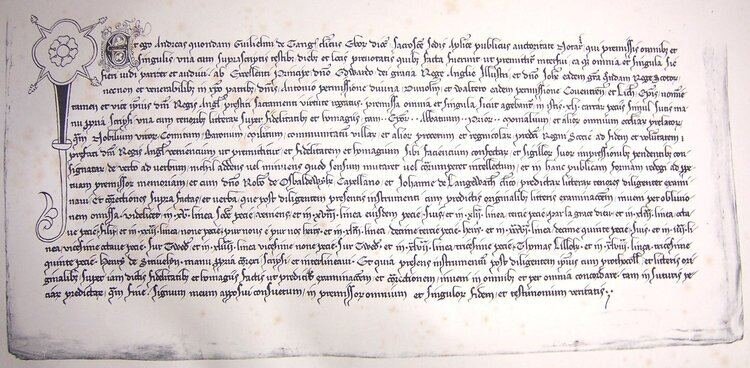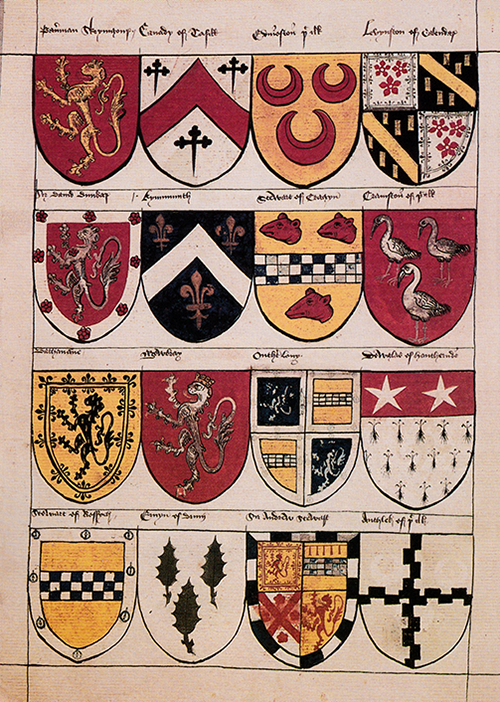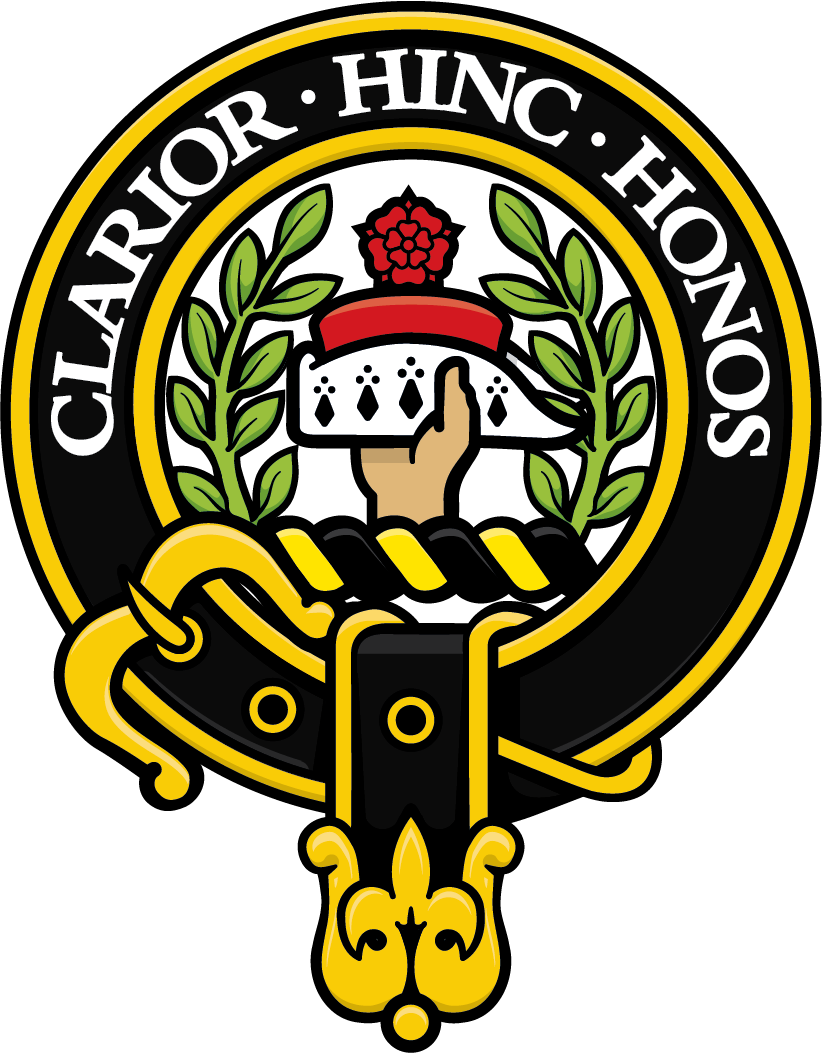BUCHANAN HERALDRY
Buchanan heraldry provides important symbols of the leadership of the clan. The principal symbols are the Clan Chief’s Coat of Arms and the Crest Badge.
The Clan’s colours are Gold (Or) and Black (Sable).
The Early Heraldry of the Laird’s of Buchanan
1296
The first reference to Buchanan heraldry is found in the “Ragman Roll” dated 28 August 1296, where Malcolm de Bougheannan, for the Earl of Stirling (Comitis de Strivelin), is mentioned.
The seal attached to the Roll is either a Fox or a Wolf and the inscription ‘S'Macolmi Nvadeoc’.
This is probably Malcolm ( MacAbsalon) of Buchanan who did homage in 1293 and served as a witness to a charter granted to Sir John of Luss by Maol Choluim I (Malcolm I), Mormaer (Earl) of Lennox.
Buchanan Coat of Arms from the Armorial de Berry, 1445
Fox, Wolf or Bear head? In Scotland's Historic Heraldry, McAndrews, 2006, the Buchanan seal is referenced "The bears' heads in the Buchanan arms are considered symbolic of |
Next, the arms of Le sire de Bouguenal ( Buchanan) can be found on Folio 159r, plate VII, of the “Armorial de Berry” in about 1445. They are pictured as Or, a chevron compony counter-compony Azure and Argent between three bears' heads erased Gules.
Translation: Or ( = gold/yellow ), a chevron ( = shaped like an upside down V ) compony counter-compony ( = the shield is divided by a pattern of 2 colors) Azure ( = Blue ) and Argent (= silver or white) between three bears' heads erased ( = Torn off roughly ) Gules ( = red ).
For a glossary of heraldic terms click here
These arms are not formally registered in the Public Register of all Arms and Bearings in Scotland ( “Lyon Register” ) as it was established in 1672.
The Armorial de Berry, 1445, folio 159r
1455
Buchanan Coat of Arms from the Scots Roll, 1455 (Colin Campbell, 1995)
The arms of Buchanane described in the “Scots Roll” (Folio 48v, about 1455) as Or, a lion rampant Sable goutty Or within a double tressure flory counter-flory Sable 26 contains many of the elements of the arms registered by John Buchanan of that Ilk in 1675, the coat of arms we recognize today.
“On a Gold shield, a Black lion rampant, scattered with golden tears, all within a Black border flory counterflory.”
One interpretation of this is that the adoption of these symbols in the Chief's arms alludes to the nearness of the Buchanan chiefly line to that of the Scottish royal line by the marriage of Sir Walter Buchanan of that Ilk, 12th Chief, with Isobel, daughter of Murdock Stewart, 2nd Duke of Albany. The tears may allude to the execution of Murdoch and his sons.
The Scots Roll, 1455, folio 48v
Reference in the ‘Scots Roll’ of Heraldry
The “Scots Roll” – This Heraldic Roll of the 15th century (1455) contains 144 coats of arms, amongst which is a coat of arms in the name of BUCHANANE. This is obviously an early spelling of Buchanan and the arms are most definitely those of Buchanan. The blazon is of interest as it alludes to the CBSI inc. assumed flag where goutty Sable (ie. black tears) appear. The blazon is, “Or, a lion rampant Sable goutty Or within a double tressure flory counter flory Sable” (Scots Roll Number is SC057, www.heraldry-scotland.co.uk/scots.html).
In non-heraldic language, the blazon would read, “On a Gold shield, a Black lion rampant, scattered with golden tears, all within a Black border flory counterflory.”
1601
The arms of Sir John Buchanan of that Ilk, Lennox and Perth.
“Sir Walter Buchanan of that Ilk married Isabella daughter of Murdoch [Stewart] Duke of Albany, and by this reason changed the arms from the old bearings, known from seals as three boars’ heads erased, to a rampant lion within a double treasure, differenced only from the Royal arms by tincture.”
As published in Lord Crawford's Armorial
By The Earl of Crawford and Balcarres
In the Bibliothera Lindesaiana
Dated 1601, page 291
Folio: 122v
1657
The Chief’s crest. It cannot be used in this form except by the Chief of Clan Buchanan
Following the Battle of Baugé of 1421, in which Sir Alexander Buchanan (son of the Chief) killed the Duke of Clarence (second son of King Henry IV of England).
The Black and Gold torse (or wreath) reflects the colours of the Chief’s arms, employed since 1455: Or (gold) and Sable (Black).
The graphics (on this row) were illustrated in 2020 to try and rein in the myriad interpretations that appear online. Although an illustration of the badge is technically acceptable, we really would prefer you used the official version shown here (with the black belt) to increase brand strength.
This Crest is officially “owned” by the Chief of Clan Buchanan, but can be employed by any Buchanan
1675
Our Clan Chief’s current Coat of Arms, initially recorded by Lord Lyon in 1675
By the time the Public Register of All Arms and Bearings in Scotland was created by the Scottish Parliament in the reign of Charles II in 1672, the arms of Buchanan had changed to the form with which we are familiar today (Right).
These arms reflect those of Scotland’s Royal family with the Rampant Lion’s tincture (colour) changing from Gules (Red) to Sable (Black). The following three events are believed to have resulted in a total transformation of the symbolism in the Chief's arms:
1425 – Execution by James I of Scotland, of his first-cousin, Murdoch Stewart, 2nd Duke of Albany, and Murdoch's two older sons for treason
1443 – Marriage of Isobel Stewart [daughter of Murdoch Stewart, 2nd Duke of Albany, Regent of Scotland, and his wife Isobella, daughter of Donnchadh (Duncan), Mormaer (Earl) of Lennox] to Sir Walter Buchanan, 12th Chief.
However, the seal of George Buchanan, about 1557, Three bears’ heads erased, is similar to the 1445 arms. 27
Since then, arms have been granted to many members of the extended family and to clan members based upon these arms. Today we have a large and honourable “Roll of Armorial Achievements of the Clan Buchanan.”
1993
To learn more about the Lion, click here…
First described in the 1993 Buchanan Banner: Link.
The Scots Roll 1455 blazon draws to mind the current CBSI flag (assumed) and, today, the tears provide a reminder not to lose the Clan Chief again. The CBSI Rampant Lion flag predates the matriculation to the current Chief by Lord Lyon in 2018 of the last Chief’s Coat of Arms (last registered in 1675). This is not an ‘official’ heraldry symbol - merely a casual reflection, approved for use by the chief.
The CBSI flag is described in heraldic terms as, “Or, a lion rampant Sable armed and langued Gules charged with five goutte Argent all within a double tressure flory counter flory Sable.” The silver (ie Argent) goutte (tears) represent sorrow for the loss of the Clan Chief in 1681.
The CBSI has used this flag for some time and the Chief has approved its continued use as one of the society’s symbols so that we do not forget our connections to the Chief and the Clan.
CBSI Black Lion flag
2002
The above crying Black Lion as approved by Lord Lyon was a part of the CBSA (America) Coat-of-Arms application. In 2002 the CBSI (International) were granted its own Coat of Arms. For details Click here
2022
In 2022 The Chief of Clan Buchanan John Michael Buchanan of that Ilk (“The Buchanan”) re-matriculated his Arms as a part of his inauguration as Chief of Clan Buchanan. These arms are obviously his personal arms and can not be utilised by anyone other than him.
2023
The Clan Badge was subtly updated by the CBSI in 2023 (ie, there have been various reproductions in use, but this is the version we regard as ‘correct’). Minor corrections in our artwork (like the ‘style’ of the rose and better illustrating the ducal cap of maintenance). This form has been used for many years.
But mainly the update was changing the belt to black with a gold outline to signify that we have a chief, and are no longer armigerous.















